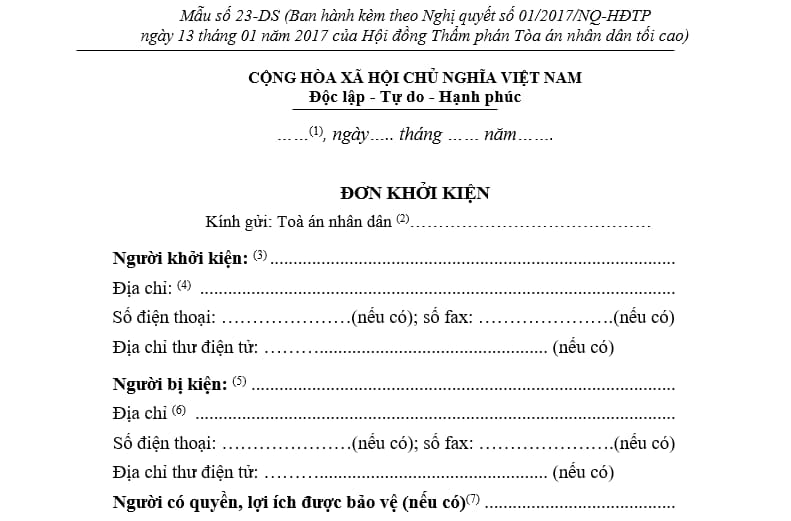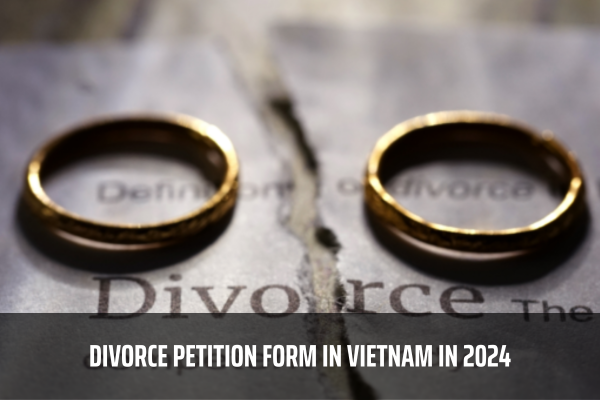What is the latest divorce petition form in Vietnam in 2024? What are the regulations on divorce at the request of one spouse in Vietnam?
- What is the latest divorce petition form in Vietnam?
- What are the regulations on divorce at the request of one spouse in Vietnam?
- Who has the right to request settlement of divorce in Vietnam?
- What are the regulations on looking after, care for, raising and education of children after divorce in Vietnam?
- Vietnam: May the person directly raising children after divorce be changed?
What is the latest divorce petition form in Vietnam?
The divorce petition form must not be written arbitrarily but must adhere to the standard form issued by the Council of Judges of the Supreme People's Court in Resolution 01/2017/NQ-HDTP amended by Resolution 04/2018/NQ-HDTP.
Specifically, according to form No. 23-DS, Resolution 01/2017/NQ-HDTP, the divorce petition form is as follows:

Download the divorce petition form: Here

What is the latest divorce petition form in Vietnam in 2024? What are the regulations on divorce at the request of one spouse in Vietnam? (Image from the Internet)
What are the regulations on divorce at the request of one spouse in Vietnam?
Pursuant to Article 56 of the Law on Marriage and Family 2014, divorce at the request of one spouse is as follows:
- When a spouse requests a divorce and the conciliation at a court fails, the court shall permit the divorce if it has grounds to believe that a spouse commits domestic violence or seriously infringes upon the rights and obligations of the husband or wife, which seriously deteriorates the marriage and makes their common life no longer impossible and the marriage purposes unachievable.
- When the spouse of a person who is declared missing by a court requests a divorce, the court shall permit the divorce.
- For request for a divorce under Clause 2, Article 51 of the Law on Marriage and Family 2014, a court shall permit the divorce if it has grounds to believe that the domestic violence committed by one spouse seriously harms the life, health or spirit of the other.
Who has the right to request settlement of divorce in Vietnam?
Pursuant to Article 51 of the Law on Marriage and Family 2014, the right to request a divorce is specifically stipulated as follows:
The right to request settlement of divorce
1. Husband or wife or both has or have the right to request a court to settle their divorce.
2. A parent or another next of kin of a spouse has the right to request a court to settle a divorce when the spouse is unable to perceive and control his/her acts due to a mental disease or another disease and is concurrently a victim of domestic violence caused by his/her spouse which seriously harms his/her life, health or spirit.
3. A husband has no right to request a divorce when his wife is pregnant, gives birth or is nursing an under-12-month child.
Thus, people with the right to request settlement of divorce include:
- Husband or wife or both has or have the right to request a court to settle their divorce.
- A parent or another next of kin of a spouse has the right to request a court to settle a divorce when the spouse is unable to perceive and control his/her acts due to a mental disease or another disease and is concurrently a victim of domestic violence caused by his/her spouse.
* Note: A husband has no right to request a divorce when his wife is pregnant, gives birth or is nursing an under-12-month child.
What are the regulations on looking after, care for, raising and education of children after divorce in Vietnam?
Pursuant to Article 81 of the Law on Marriage and Family 2014, it stipulates the looking after, care for, raising and education of children after divorce as follows:
- After a divorce, parents still have rights and obligations to look after, care for, raise and educate minor children or adult children who have lost their civil act capacity or have no working capacity and no property to support themselves in accordance with this Law, the Civil Code and other relevant laws.
- Husband and wife shall reach agreement on the person who directly raises their children and on his and her obligations and rights toward their children after divorce. If they fail to reach agreement, the court shall appoint either of them to directly raise the children, taking into account the children’s benefits in all aspects. If a child is full 7 years or older, his/ her desire shall be considered.
- A child under 36 months of age shall be directly raised by the mother, unless the mother cannot afford to directly look after, care for, raise and educate the child or otherwise agreed by the parents in the interests of the child.
Vietnam: May the person directly raising children after divorce be changed?
Pursuant to Article 84 of the Law on Marriage and Family 2014, it is stipulated the hange of the person directly raising children after divorce is as follows:
Change of the person directly raising children after divorce
1. At the request of a parent or a person or an organization prescribed in Clause 5 of this Article, a court may decide to change the person directly raising a child.
2. Change of the person directly raising a child shall be settled when there is one of the following grounds:
a/ The parents agrees on change of the person directly raising a child in the interests of this child;
b/ The person directly raising the child no longer has sufficient conditions to directly look after, care for, raise and educate the child.
3. Upon change of the person directly raising a child aged full 7 or older, this child’s desire shall be taken into account.
4. When seeing that both parents fail to have sufficient conditions to directly raise a child, a court shall decide to assign this child to a guardian in accordance with the Civil Code.
5. When there is the ground prescribed at Point b, Clause 2 of this Article, in the interests of a child, the following persons, agencies or organizations have the right to request change of the person directly raising this child:
a/ Next of kin;
b/ The state management agency in charge of families;
c/ The state management agency in charge of children;
d/ The women’s union.
Thus, based on the above regulations, the change of the person directly raising a child shall be settled when there is one of the following grounds:
+ The parents agrees on change of the person directly raising a child in the interests of this child;
+ The person directly raising the child no longer has sufficient conditions to directly look after, care for, raise and educate the child.
LawNet